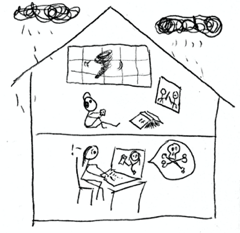Home » Note From the Editor-in-Chief
Note From the Editor-in-Chief
October 30, 2020
From The Carlat Child Psychiatry Report
Josh Feder, MD
Dr. Feder has disclosed that he has no relevant financial or other interests in any commercial companies pertaining to this educational activity.
With a surging pandemic and cultural turmoil, we are all working as best we can. At Carlat, we are striving to give you what you need to keep going. Every clinician needs to prepare for disasters, even if that is mainly knowing how to support your own patients when disaster strikes. And every clinician, it turns out, needs to know how to talk with patients and families about the possibility of treatment-emergent suicidality with antidepressants.
We had quite a conversation with Dr. Ignaszewski and Dr. Spielmans about why informed consent for antidepressants requires this “duty to warn.” Dr. Dilley walks us through strategies to manage video gaming, and we discuss dyslexia so that you know what it is and what to do about it.

Here’s a quick illustration I did representing the content of this issue. See if you can spot all the elements.
Worried about air pollution and mental health? Listen to our podcasts. And give us feedback—tell us what you want to hear about. We are with you, and we want to help.
Josh Feder, MD
jfeder@thecarlatreport.com
Child PsychiatryWe had quite a conversation with Dr. Ignaszewski and Dr. Spielmans about why informed consent for antidepressants requires this “duty to warn.” Dr. Dilley walks us through strategies to manage video gaming, and we discuss dyslexia so that you know what it is and what to do about it.

Here’s a quick illustration I did representing the content of this issue. See if you can spot all the elements.
- A child gaming in his room upstairs representing the gaming addiction interview with Dr. Dilley.
- Beside him is a tousled, too-thick-book at his feet representing the clinical update on dyslexia.
- Outside there are storms and a tornado representing the clinical update on community disasters.
- Downstairs a parent is hearing from a doctor about the possible suicidality from the antidepressants representing the clinical update on duty to warn.
Worried about air pollution and mental health? Listen to our podcasts. And give us feedback—tell us what you want to hear about. We are with you, and we want to help.
Josh Feder, MD
jfeder@thecarlatreport.com

Issue Date: October 30, 2020
Table Of Contents
Recommended
Newsletters
Please see our Terms and Conditions, Privacy Policy, Subscription Agreement, Use of Cookies, and Hardware/Software Requirements to view our website.
© 2026 Carlat Publishing, LLC and Affiliates, All Rights Reserved.


_-The-Breakthrough-Antipsychotic-That-Could-Change-Everything.webp?t=1729528747)



